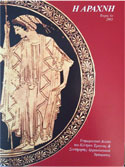September's word: To akron aōton
The word ἄωτος is very probably included in a wide linguistic cluster together with the old verb ἄημι (to blow), αὔρα, uentus, ἄελλα, αὔξω. Semantically, it is something that is born almost from nothing and gradually grows, swells, like plants.
The expression ἄκρον ἄωτον (seen in later sources, e.g. Callimachus) would refer to the extreme ἄωτον, flake, ball, “flower” of wool, flax, youth, water etc. In Homer, it has mostly the meaning of the finest wool “οἰὸς ἄωτον” (Il. 13.599, 716, Od. 1.443) and flax “λίνοιό τε λεπτὸν ἄωτον” (Il. 10.661), but there are also later references in Platon and elsewhere that refer to very fine products of high quality. The term came to mean the extreme exaggeration, the colophon, the overflow.
[Τhe term ἄωτος, “without ear”, has no etymological or linguistic connection to the previous one. It is composed by the privative or better negative α < n̥ + οὖς and the reason why the privative has the form α and not αν, as would be expected, is because there would be a ϝ at the beginning of the word, e.g. οὔατος < οϝατος, with alternation οϝ <> ϝο. In Mycenaean tablets we find the name Ὀρθϝώϝης = Otuwowe, “with raised ears”].


